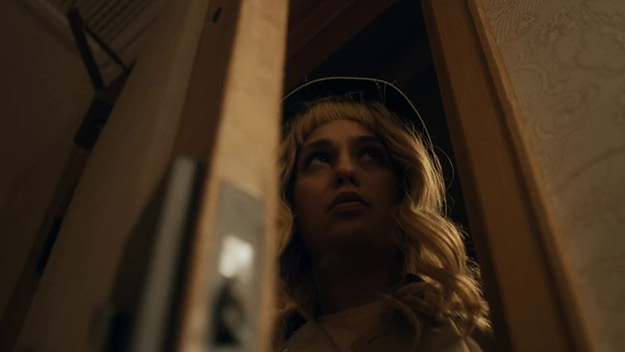Deep Focus: Gemini

Gemini begins with a topsy-turvy image of palm trees. They dangle in a purple noir sky, canopies down, like jokey, fuzzy earrings hanging from the lobes of unseen giants. Then the camera shifts to reveal that we’re simply in Los Angeles. That nifty yet shallow visual introduction suits this L.A. murder mystery. It starts suggestively and enigmatically, then straightens—and flattens—everything out, including the emotional and moral landscape of its characters.
The amateur sleuth at the center of this schematized swirl is Jill (Lola Kirke), the prematurely frumpish personal assistant to a sexy up-and-comer called Heather (Zoe Kravitz). Heather is the kind of will-’o-the wisp star who cancels commitments and nixes reshoots, but she’s popular enough to attract her own personal paparazzo, Stan (James Ransone).
The writer-director-editor, Aaron Katz, uses Stan to get the exposition out of the way. He peppers Jill with questions about Heather’s recent breakup with another boldface name, Devin (Reeve Carney), and her rumored intimacies with a female model, Tracy (Greta Lee), and also, possibly, with Jill herself. But all Katz does here is to set up a slow-speed suspense film around the elusive personality and talents of this Girl Friday. Then he stuffs unexceptional notions of the City of Angels into a dead-end plot.

When Jill stumbles into a high-profile homicide scene, every clue points to her guilt. She must use her job skills to clear herself. She strives to be invisible while tracking down likely suspects whose phone numbers and addresses she carries in her smartphone or her head. Each name Jill utters in an opening flurry of relayed messages figures later in the action, usually for just one italicized scene or two. In a display of this film’s would-be wit, police detective Edward Ahn (John Cho) proves his acumen when he says he bets that Jill remembers more than most people.
Whether or not Jean-Paul Sartre was correct when he wrote, “Hell is other people,” that dictum applies to Jill and Heather’s small circle of frenemies. Even a semi-likable guy, an obsessive moviemaker named Greg (Nelson Franklin), acts as if cinema is more of a life-or-death priority than, you know, life.
Heather’s ex-boyfriend, Devin, embodies fragile male vanity. When he disparages Jill’s newly bleached blonde hair, which is part of her fugitive disguise, we can’t help noting that Devin sports a chic streaked hairdo. Heather’s manager, Jamie (Michelle Forbes), epitomizes Tinseltown mash-ups of personal and professional feelings when she tells Jill she quite likes her even though she knows they hate each other.

As far as this movie goes, that’s entertainment. Not enough is fresh or at stake in Katz’s catalogue of La-La Land amorality, no matter how artfully he wraps it in a dull glare or cloudy daylight and glowing nightlights. (“Neon,” naturally, is this film’s distributor.) The camera sometimes sways between characters with a calculated languor, but more often it pins them down and turns the screen into a specimen board.
Once we might have considered a media figure’s aide de camp a daring choice to anchor a tale about celebrity neuroses and entitlement. But that was before other talented twentysomethings, like Mia Wasikowska in David Cronenberg’s Maps to the Stars (2014) and Kristen Stewart in Olivier Assayas’s Clouds of Sils Maria (2014) and Personal Shopper (2016), played paid helpers with their own oscillating connections to established women. Is it a sign of our accelerated times that the scenario now feels so mid-decade?
This movie, unfortunately, isn’t an understudy’s triumph like All About Eve. Until we reach a brief, evocative coda, it isn’t even a barbed black comedy about a service provider making a power grab because she’s sick of taking heat for her boss. Nor is it a tale of female arrested adolescence, for a change, which is too bad. In the most relaxed and impromptu and thus most promising scene, Jill concocts a St. Germain–Mello Yello cocktail while she and Heather reminisce about Seventeen magazine back in the ’90s, when Jonathan Taylor Thomas (Simba in The Lion King) was a big fan favorite. For a few minutes they convince us they could have been pre-Facebook “friend” friends.

No, this movie simply depicts the seven deadly sins in an absurdist climate that renders them merely venal. Lust, greed, sloth, wrath, envy, pride, even gluttony if you count a joke when Greg maliciously orders two plates of every “app” on a menu, then leaves the restaurant before they arrive, saddling Jill with the check.
In Katz’s previous mystery, Cold Weather (2010), set in his native city of Portland, the moviemaker cooked up an authentic slacker atmosphere. That film’s lack of urgency suited its oddball tone, and the performers were loose and spontaneous in a beguiling, youthful way. Katz contends that he knows and loves L.A., but you wouldn’t guess it from Gemini. He does scatter some pungent details—like a tiki-bar version of Rimsky-Korsakov’s Scheherezade that gets piped into the Tonga Hut in North Hollywood. But Katz views this town as a red-hot vacuum that sucks in any wannabe players.
We respond to the professional force and glints of attitude that Cho and Forbes bring to the cop and the manager, respectively, rather than to any revelations of their characters. Kirke, who was sensational in Mistress America, does what she can to make an unformed woman like Jill fascinating. Katz is too busy scoring points about the existential inertia of L.A. drifters and poseurs to give her more to work with than a scrap of backstory.

Like Katz, Jill comes from Portland, but the writer-director-editor hasn’t mined their shared history for the barest glimmer of insight about the fears and desires that drive a woman to become a supporting player in her own life. When the detective asks Jill what she wanted to be when she was studying at a prestigious prep school, she can’t summon an answer—and Katz doesn’t help Kirke indicate whether she has too much to say about that or too little.
Gemini is a mystery in search of its own pulse. In the zippiest moment, Jill steals Greg’s cellphone-charger. The film is what needs the charge.
Michael Sragow is a contributing editor to Film Comment and writes its Deep Focus column. He is a member of the National Society of Film Critics and the Los Angeles Film Critics Association, and a contributor to the Criterion Collection.




